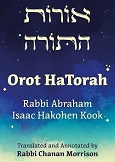
Two Terms for Death
The Torah employs different words for death. The most commonly used term is mitah, but occasionally the Torah uses the word geviah, usually translated as ‘expiring.’ What is the difference between the two?
The Talmud in Baba Batra 16b notes that the Torah uses both terms when describing the deaths of Abraham and Isaac. The Sages understood that this Biblical syntax indicates that a righteous individual has passed away. Why is that?
This conclusion is especially difficult in light of the Torah’s account of Moses’ death. There the Torah only uses the word mitah — “and Moses died there” (Deut. 34:5). Why didn’t Moses merit to have his demise described as geviah? Was he less righteous than Abraham and Isaac?
Geviah and Mitah
Rav Kook explained that geviah and mitah refer to two distinct aspects of death. One concerns the effect of death on the body, while the second indicates its effect on the soul.
With regard to the body, death is the natural cessation of the body’s powers and continued functioning. This aspect of death is referred to as geviah, expiring.
As for the soul, death terminates the soul’s bond to the body and its control over it. This is called mitah.
Both aspects of death do not always occur. Not everyone succeeds in reaching the natural end of his body’s powers. The wicked who die before their allotted time due to their actions, have hastened their own physical passing. Geviah is the natural expiration of the body in its proper time, without some ruinous force hastening its demise. Therefore, geviah only occurs with the righteous.
On the other hand, mitah, the break between the soul and the body, applies to all people, righteous and wicked alike. After the sin of Adam, it became essential for the soul to recover from the negative influences and distractions of the body. Life in our physical world impresses upon the soul damaging images, distancing the soul from true closeness to God. To rectify these influences, death severs the soul’s connection to the physical body, neutralizing the influence of those emotions and material desires. Only then can the soul be cleansed and made ready to accept the brilliant light from God’s Presence.
Moses’ Death
Unlike other righteous tzaddikim, Moses succeeded in overcoming the legacy of Adam’s sin. At Mount Sinai, he was able to go without food and water for 40 days. Even after 120 years, his body did not need to die. His physical functions were still at full strength, as the Torah attests, “His eyes had not dimmed and his natural powers had not left him” (Deut. 34:7). Therefore, the Torah does not use the word geviah to describe the natural expiration of Moses’ body.
Moses only needed the second aspect of death, for his soul to be severed from the body and its influences. And even that necessity was due solely to his connection to the Erev Rav, the Mixed Multitudes whom he allowed to join in the exodus from Egypt (Zohar Gen. 25a).
(Adapted from Midbar Shur, pp. 242-249)





